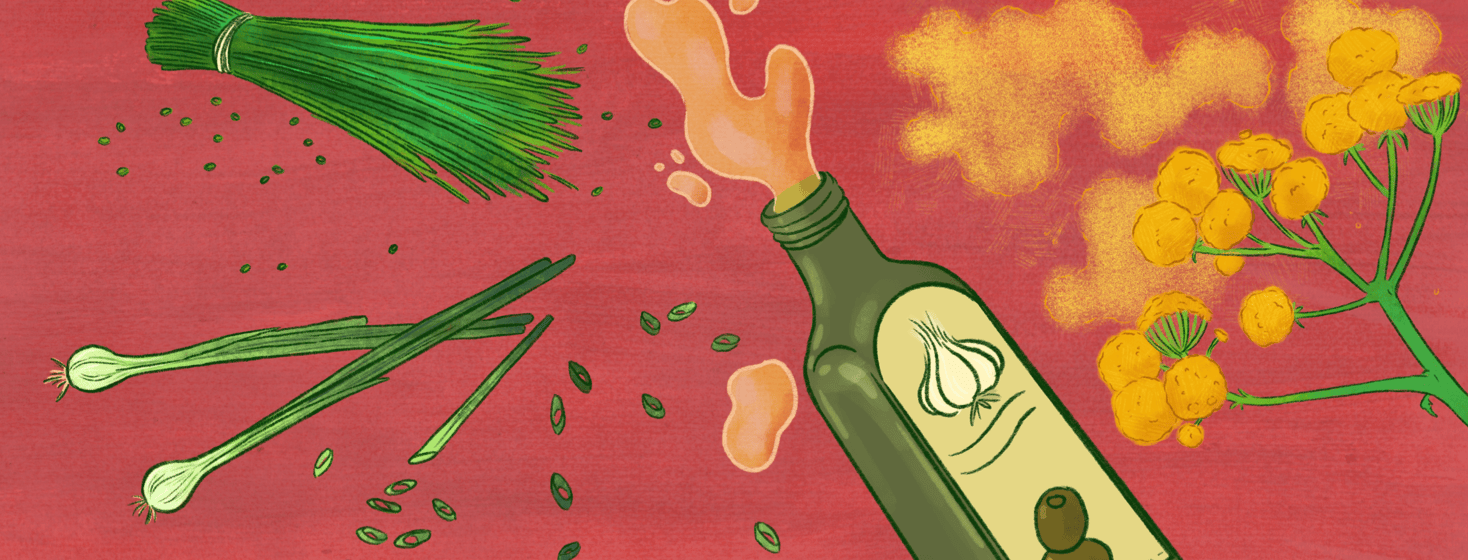Low FODMAP Onion and Garlic Substitutes
If you’re following the low FODMAP diet to manage your IBS symptoms, one of the first things you likely learned is that onions and garlic are a no-go because of their high FODMAP content.
These FODMAPs, called fructans, are not absorbed by humans and are instead sent to the large intestine, where they are fermented by your gut bacteria. This may lead to IBS symptoms like gas, bloating, and abdominal pain.
But how on earth are you supposed to cook without onions and garlic? Luckily, there are many low FODMAP garlic and onion substitutes. Here are some of my favorites, plus tips for using them in your cooking.
Green onion tops
Onions are one of the first ingredients in many recipes, creating a challenge for anyone following the low FODMAP diet. However, there are low FODMAP substitutes you can use.
One of the easiest onion substitutes is scallions or green onion tops. These add a hint of onion flavor to dishes and are easy to prepare. Be sure to use only the green part of the onion, as the white part contains FODMAPs.1
If a recipe calls for a half cup of chopped onion, you can substitute a half cup of chopped scallions or green onion tops. They can be sautéed or used as a fresh garnish.
Chives
Fresh and dried chives are another FODMAP-friendly ingredient that can be used to add a hint of garlic/onion flavor to your dish. The flavor will depend on the type of chives you use. Regular onion chives will give an oniony flavor, while Asian chives or garlic chives will give a garlicky flavor. Chives are best used fresh, so try adding them as a fresh garnish to your finished meal.
Garlic-infused olive oil
One of the best substitutes for garlic is garlic-infused olive oil. The non-FODMAP garlic flavor is transferred to the oil when you cook whole garlic cloves in oil. FODMAPs are not soluble in oil, so they don’t get transferred during the cooking process.1
Use caution when making and storing infused oils. Homemade garlic-infused oil should be used immediately after preparing, or it can be stored in the refrigerator for 2 or 3 days.
Alternatively, you can purchase store-bought garlic-infused olive oil, which has been processed to make it safe for long-term storage. Ensure that the store-bought oil is certified FODMAP-free (such as FODY Foods garlic-infused olive oil).
Asafoetida
Another option for garlic lovers is asafoetida. Also called "hing," this spice is actually a dried gum extract. It is commonly used in Indian cooking.
When it is uncooked, asafoetida has quite a pungent flavor. However, once it’s used in a cooked dish, the flavor mellows out to provide a garlicky flavor. Its flavor develops best if you cook it in a small amount of oil, butter, or ghee before cooking the rest of your meal.
It’s important to note that some asafoetida contain wheat flour. Since wheat flour contains FODMAPs, be sure to check the label to ensure that the asafoetida you’re using does not contain wheat.
Do I need to avoid onions and garlic forever?
The good thing about the low FODMAP diet is that once you’ve identified your specific triggers, you can reintroduce high FODMAP foods that didn’t give you symptoms.
For example, you’ll want to avoid onions and garlic during the elimination phase of the low FODMAP diet. Once you get to the reintroduction phase, you can try small amounts of onion and garlic to see if they bother you. If you don’t get symptoms, you can include these foods in your diet in amounts that work for you.2
What’s your favorite low FODMAP garlic or onion substitute? Let us know in the comments below!

Join the conversation